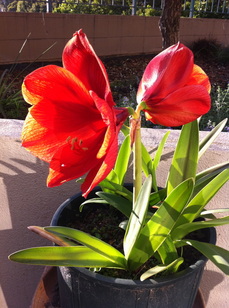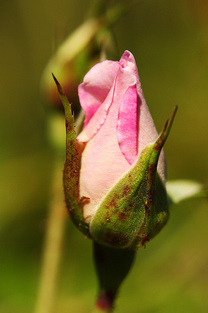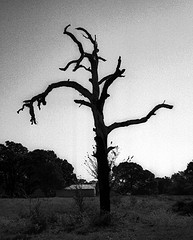 My mother's resting place / Alison R. My mother's resting place / Alison R. Were she still alive, my mother would have had a birthday May 24. When she died several years ago at the age of 96, I took her ashes and mixed them in the soil of her favorite potted plant, an amaryllis she kept on the patio near the window of her family room in Southern California. I carted that plant to my place in San Francisco, and it blooms each year on the patio where I can see it.
I tend that plant with splendid red flowers and only by being a narcissus rather than an amaryllis could it be a more apt metaphor for my work as my mother’s daughter. It has taken most of my lifetime to separate from my mother, whom I resemble, and to accept my mother’s limitations—her inability to love me. I can finally appreciate that she was a colorblind mom, and I was a rainbow she couldn’t see.
Even after I “grew up,” the filters through which I viewed life, the strategies I employed to cope influenced how I related to other people. I was that unloved and thus unlovable child of a narcissist. I experienced others as incapable of loving me, someone like my mother, to be placated and resisted. Others were probably not even aware of the role in which I had cast them.
I still can experience twinges that come from being my mother’s daughter. Sometimes while talking with people who matter to me, I feel a familiar pain. It happens if others don’t ask me more about what I am saying, but instead switch to talking about themselves. It’s as if the conversation is a competition I will lose.
It’s easy to slip back into being the daughter of a narcissistic mother. She always wanted to talk about herself rather than listen. She was proud of me only if what I did or said reflected on her as a “good mother.” She cared about my appearance and spent money to make her little girl look just right. My mother insisted that her outlook and emotions mattered more than mine and if I had a different viewpoint or feeling, she would make sure I knew that by opposing her I was causing her physical pain and suffering.
Mothers like mine, who can’t see beyond their own needs, bind their daughters to them by withholding love and insisting on unquestioning attention and love. So yes, it has been difficult to separate from my mother. Even after her death. Difficult, but not impossible.
After more than 50 years of effort, I am now peaceful with what was. I accept my narcissistic mother and being her daughter. I have compassion for us both. I can grieve for my childhood, for not being loved unconditionally by my mother or father. (Husbands to narcissistic women love them most of all and don’t cross them, so children have no protectors.)
I doubt without therapist Jennifer or meditation or Kate’s friendship in Buddhism, I would have grappled with the past, done the necessary grieving, or seen clearly the emotional patterns that developed in me because I was daughter to a narcissistic mother. I joyously acknowledge becoming a warrior with the courage to heal. And I know the answers to lifelong questions: Why do I feel unlovable? Why do I never feel good enough? Why do I have so little trust in myself?
Not only do I experience and express unconditional love for my sons, but for other significant people in my life as well, my sister, my girlfriend Corky. I can feel unconditional friendliness even for people I don’t particularly like or know. So clearly, this healing has not been just about me.
My self-acceptance can’t help but become acceptance for others. The same way I end my meditation sittings, by dedicating the merits of my practice to the peace, safety and happiness of all beings, I dedicate my healing from daughter of narcissistic mother to the peace, safety and happiness of all beings. May I strive always to cause no harm and to be wholehearted!!
 Giftbox / sparkleblues Giftbox / sparkleblues “’Tis a gift to be loved and that love to return.” Shaker song.
If in this renewed relationship Corky and I go beyond blame and hurt, we will have to do what we didn’t do the first time we were together—look with curiosity and kindness at ways we misinterpret each other.
I’ve learned the simple gift of open-eyed and openhearted attention can increase chances for “I” to fold into “we.” And it’s actually a good thing that disagreements and misunderstanding help strengthen the “we” because we will surely have both. This time we plan to tell each other when and how feelings are hurt, if not immediately, within a few days.
On Mother’s Day both of us had hurt feelings. In the afternoon, Cindy, my former daughter-in-law, (whom Corky thoughtfully introduced as my daughter) and I went to see Corky read in a Mothertongue performance. Corky was one of the original members of this feminist collective founded in 1976 by students at San Francisco State. These women write and perform scripts that dramatize their experiences. This time the script was “Mothers and Daughters.”
Although the performance was a big part of Mother’s Day for Cindy and me, when I wrote about the day in last Monday’s spiritflowsthru, I excluded Corky and Mothertongue altogether even though I knew her ties to Mothertongue were long and strong.
I went to the performance feeling generous and open toward Corky, pleased that I could bring Cindy to see her perform. Bringing her was my gift. I knew Corky would be pleased to have Cindy there. But all did not go smoothly because a reactive part of me got triggered. Pema Chodron calls it shenpa; it’s the tightening up inside that can spiral into low self-esteem or more often into blaming or getting angry with someone else.
Shenpa struck while Cindy was telling Corky and me about her upcoming trip to Turkey and Greece with her mother and twin sister. Shenpa was triggered when Corky told Cindy she had gone to Greece and talked about her experience of many years ago; I felt annoyed with Corky. I was thinking: “This is not about you. Let Cindy talk. It is her trip at the end of the month.” I heard Corky’s words not as sharing but as an interruption. Then I acted on the feeling by telling Corky to let Cindy talk.
On Tuesday, when I again saw Corky, the distance between us was palpable. Doing exactly the right thing to close that distance, we talked about our feelings. Corky said she was disappointed that I had not mentioned Mothertongue or her in my Mother’s Day blog. We had both been “hooked” by the ego’s feeling slighted.
And of course, Corky hadn’t liked being shut up. Her talking about her trip rather than Cindy telling about hers had triggered anger in me that Corky’s “I, me and my” was more important than Cindy’s experience. In the process of explaining this reaction, I said “highjack the conversation” to describe my reaction. Corky said her intention had been to connect with my daughter, to add to Cindy’s anticipation of the upcoming trip by mentioning places she had seen and suggesting sights to look for.
Looking at why I omitted the Mothertongue event and Corky from the blog, I had to acknowledge “payback” for being angry and feeling upstaged, on behalf of Cindy. Truth be told, I must have been so ego invested in Cindy that it became very much about “I, me and my.”
I reminded Corky that after the performers took their final bow, she right away went to talk to other people. And though I knew logically this was her turn to star, I would have liked her to acknowledge my specialness and invite Cindy and me to join her for dinner. Clearly, feeling overlooked or ignored is a big cause of my shenpa, a “hook” as Pema calls those reactive places.
To help this renewed relationship flourish, I need to look at my responses and behavior with caring curiosity and to direct that same caring curiosity toward Corky’s way of being in the world. I am eager to learn what hooks me emotionally and causes me to react. (What Pema calls shenpa.)
Corky and my relationship may not be a simple gift, but careful unwrapping may make it a gift of being loved and loving in return.
 Happy Mother's Day / aussiegall Happy Mother's Day / aussiegall Mother’s Day. Forget Hallmark sentiments! The nitty gritty of Mother’s Day is far more poignant, replete as it is with loss and weariness as much as it is with gratitude. Sunday, 6 a.m.
Personally, I am grateful that each of my three sons would Friend me on Facebook if that mattered to them and let me look in on their lives. By the end of the day, all three will have checked in with news and the always welcomed and reassuring, “I Love you, Mom.” As for what will be in the hearts of others on this day of compulsory love, my guess is it’s mixed. I know that one son and granddaughter have had a week of missing mom. My little one will have shed tears and had tantrums of wanting mother who, having died a year ago, won’t be there to ooh and aah over a crayoned card with lace made in the classroom just for her. This child will carry the loss of her mother throughout her life. And each Mother’s Day will be more and less than a card could convey. I hope she will love herself. The wife of another son will probably receive cards from her preteen daughters. Her love for these girls can’t be questioned, yet it is work to be their mother as each girl struggles to take her place in the complicated family that the mother’s divorce and remarriage have created for them. Mother will be tired. On this day, I hope she can rest and feel gratitude. I hope she will love herself. Sunday, 10:00 a.m. My son in the Philippines says my grandson who lives in the East Bay has called him to say he is pleased with his life. Sometime during the day, this grandson may call me, as well. If he doesn’t, that is all right too. My son tells me my granddaughter who lives in the Philippines now has a pit bull she calls Kaito. This strikes me as good news. Sunday, 6:00 p.m. My former daughter-in-law took me to lunch today. Although she and her mother have a warm relationship and see each other often, today it is my turn. Two years ago when she was no longer married to my son, I promoted her to daughter and love her as my own. I hope that she can befriend her loneliness. On this Mother’s Day I imagined myself again in a family’s sunny front room, sitting in the glider by the window, rocking their two month old, as if he were my own. I held him Saturday and will hold him again Monday. The soft sprawl of the baby boy’s body in my arms, the dream breath that catches in his throat and comes out in tiny sounds and the dampness of our touching cheeks is a gift I have been given that makes every day I hold him another Mother’s Day. He lives in my heart as do his mother and father, as if I am mother to them all. Sunday, 8:00 p.m. It was Mother’s Day. And while I said to forget Hallmark sentiments, I did welcome the love expressed to me. I welcomed every moment when I, too, could express my love. Mother’s Day has been one more day to encourage those I love and who love me “…to touch the place of oneness within our common heart.”* * Writer, peace activist, Danaan Parry
 Fallen / unpolarized I have a history of depression. Yet seeing Brian Copeland’s one-man show, The Waiting Period, about how Copeland dealt with his depression-induced desire to die, did not depress me. Though the show is sad, it is also funny and kind. He tells us that his real agenda has been to reach out and say to anyone who is depressed or knows depressed people that depression is an illness. With help, he understood that it was not his fault his life had suffering in it. We applauded, grateful he was willing to tell his story.
From the front row in the darkened theater, I reflected on my own relationship with this illness and on my own story. Doubtless, I had always been depressed, as a little girl, adolescent and young woman. Yet I first felt the full force when I married and had two sons within 19 months of each other before I was 24 years old while trying to graduate from college. Grief and disappointment – self-hate – exhausted me. I had so wanted to be special, someone the high achievers in the family could admire. This no longer seemed possible, at least not in a good way.
When finally, many years later my psychiatrist prescribed antidepressants, I felt life out from under depression. Ah Prozac! For the first time I could draw two complete deep breaths; tension let go of me. But about five years into Prozac, depression returned bringing with it suicidal thoughts. We switched me from Prozac to Paxil.
The nadir came in 1995 when depression really flattened me. After years and years of excelling as a high school journalism teacher and sort of feeling special, I took an illness leave. A student’s accidental death at the hands of another student and the administration’s inept handling of the event had made me too angry to be in the school. I left Southern California to live with my sister and her 16-year-old daughter in Willits, a tiny town two-and-a-half hours by car north of San Francisco. Thinking incorrectly that my sister’s life had something to teach me, I went off my medication. Attempting to fit into the life that worked for my sister, I tried to think and act in ways that didn’t suit me. Nothing I turned my hands to worked for me. I could not get hired by the Willits community newspaper. I did not get cast in a play, a role I believed I could do well. In short, I was at loose ends, lost and purposeless. Depression rose up strong with this feeling of being nothing special. I compared myself with my sister and felt myself even more wanting. I couldn’t breathe.
I could do nothing but trudge through this rural community memorizing Rumi’s poem, “Zero Circle.” Eventually, I got in bed and couldn’t get up. My sister sat a suicide watch with me and helped me to make it back to my psychiatrist in Southern California.
Once again, he put me on an antidepressant, which happened to be Zoloft because that was the sample the salesman had left him. He told me to go back to teaching as soon as possible. So I joined a staff at a year-round inner city high school in Southern California, advising the practically nonexistent newspaper and the yearbook that used three staffs, one for each of the three tracks of students that make up a year-round high school. The job was depressing, but I was not as depressed as I had been with nothing to do. Doing was what I did best to hold off depression, doing and medicating. And actually producing a yearbook was a feat of specialness, especially coupled with preventing the theft of all the cameras and computers.
In 1999 I retired to San Francisco to live upstairs above my son and then daughter-in-law. For a while, a low dose of Sertraline, a Zoloft generic, kept the illness manageable until two years ago, when again depression threatened to pull me under. But rather than increase medication, I turned to meditation and a new therapist. The work has been to befriend this part of myself, a part I have spent a lifetime pushing away. Befriending depression is not easy, and I limit its visits whenever it threatens to overstay its welcome. I have also lightened up considerably on the need to be any more special than anyone else.
So after seeing The Waiting Period and curious about my own current relationship with depression, I took diagnostic tests for the illness featured on various websites. I achieved low marks. Low marks on these tests are very good indeed! Kudos to the two of us.
|
 My mother's resting place / Alison R.
My mother's resting place / Alison R. 


 RSS Feed
RSS Feed